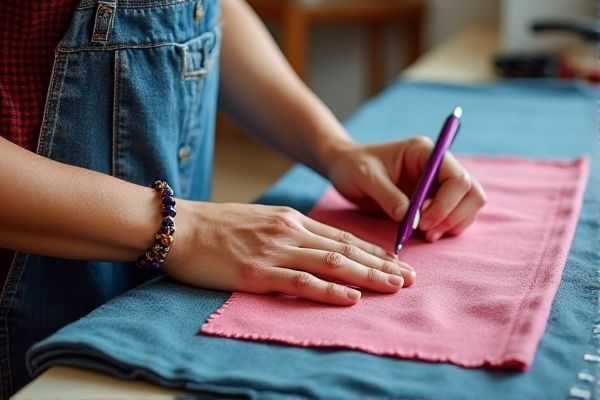
Bangladesh's vibrant textile industry offers numerous fabric marketing job opportunities, particularly in cities like Dhaka and Chittagong, which serve as major manufacturing hubs. Companies seek professionals skilled in market research, brand management, and sales strategies tailored to both domestic and international markets. Knowledge of fabric types, trends, and sustainable practices is highly valued, enhancing candidates' competitiveness. Networking within industry events can also facilitate job prospects and foster valuable connections in this growing sector.
Job Description
Fabric marketing jobs in Bangladesh involve promoting various textiles and apparel products to retailers, manufacturers, and wholesalers. These roles require understanding market trends, consumer preferences, and effective sales strategies that resonate with the local and international markets. Proficiency in communication and negotiation skills is essential, as is knowledge of the Bangladeshi textile industry, which is known for its cotton and jute production. Success in this field can lead to significant career growth, making it a valuable opportunity for individuals interested in the vibrant fabric and fashion sector.
Requirement
Fabric marketing jobs in Bangladesh require candidates to possess a solid understanding of textile industry trends and consumer preferences. Strong communication skills, both verbal and written, are essential for effectively promoting products and engaging with potential clients. A bachelor's degree in marketing, business, or a related field is typically preferred, alongside experience in sales or marketing within the textile sector. Familiarity with digital marketing tools and e-commerce platforms can significantly enhance your prospects in this competitive job market.
Salary and Perks Expected
Fabric marketing jobs in Bangladesh offer competitive salaries that can vary significantly based on experience and the company's size. Entry-level positions typically start around BDT 25,000 to BDT 35,000 per month, while experienced professionals can earn upwards of BDT 50,000 to BDT 100,000 monthly. In addition to a stable salary, many companies provide bonuses, commissions on sales, and health benefits, enhancing the overall compensation package. Opportunities for career advancement and skill development in the vibrant textile industry contribute to a rewarding work environment.
Similar Job Names
- Fabric Marketing Manager
- Textile Sales Executive
- Merchandiser
- Brand Development Specialist
- Fabric Product Manager
- Marketing Coordinator
- Business Development Executive
- Fiber Marketing Specialist
- Digital Marketing Specialist
- Marketing Analyst
- Fabric Sourcing Officer
- Public Relations Officer
- Market Research Analyst
- Customer Relationship Manager
- Supply Chain Marketing Executive
Job Expectation Concept
Fabric marketing jobs in Bangladesh involve promoting and selling a wide range of textile products, catering to both domestic and international markets. Professionals in this field must understand the unique preferences of Bangladeshi consumers and stay updated on global trends to effectively position their products. Building relationships with manufacturers, retailers, and customers is essential for success in navigating local market dynamics. A strong emphasis on quality, design, and sustainability can significantly enhance your impact in this competitive industry.
Career Advantage and Weakness
Fabric marketing jobs in Bangladesh offer significant career advantages, including a booming textile industry that provides ample opportunities for growth. You can leverage your skills in sales and marketing, potentially leading to lucrative positions in one of the world's largest garment exporters. However, challenges such as intense competition and fluctuating market demands can pose significant obstacles. An understanding of consumer preferences and a strong network can help you navigate these weaknesses effectively.
Important Thing Must Know
Fabric marketing jobs in Bangladesh offer diverse opportunities within a rapidly growing textile industry. Professionals in this field engage in promoting various types of fabrics, collaborating with manufacturers, retailers, and designers to understand market demands. Knowledge of local and international trends in fashion and textile production can significantly enhance your effectiveness in this role. Strong communication and negotiation skills are essential, as building relationships with suppliers and clients is crucial for success. Understanding consumer preferences and market dynamics in Bangladesh will enable you to develop targeted marketing strategies that resonate with audiences.
Alternative Career Options
Fabric marketing professionals in Bangladesh can explore various alternative career options within the textile and apparel industry. Opportunities include roles in supply chain management, where you can leverage knowledge of sourcing and logistics to enhance efficiency. Another option is product development, allowing you to engage in designing innovative fabric products that meet market demands. Sales and business development roles further enable you to utilize your marketing expertise to expand client relationships and drive revenue growth in diverse markets.
Companies List
- Dhaka Garment Manufacturers and Exporters Association (BGMEA)
- Bangladesh Textile Mills Association (BTMA)
- Eastern Spinning Mills Ltd.
- Bangladesh Denim Expo
- Ananta Group
- Square Fashions Ltd.
- Pacific Jeans Ltd.
- Ananta Apparels Ltd.
- Opex Group
- Nassa Group
List of Ideal City
Dhaka, the capital of Bangladesh, serves as a major hub for fabric marketing jobs, with its bustling textile industry and numerous garment factories. Chittagong, known for its port facilities, also offers significant opportunities due to its proximity to export-oriented companies. Narayanganj, recognized for its established textile and dyeing industries, provides a strong market for marketing professionals in the fabric sector. Sylhet, while less traditional, is growing in this industry thanks to its unique local fabrics and increasing demand for regional designs.
 jobs-bangladesh.com
jobs-bangladesh.com